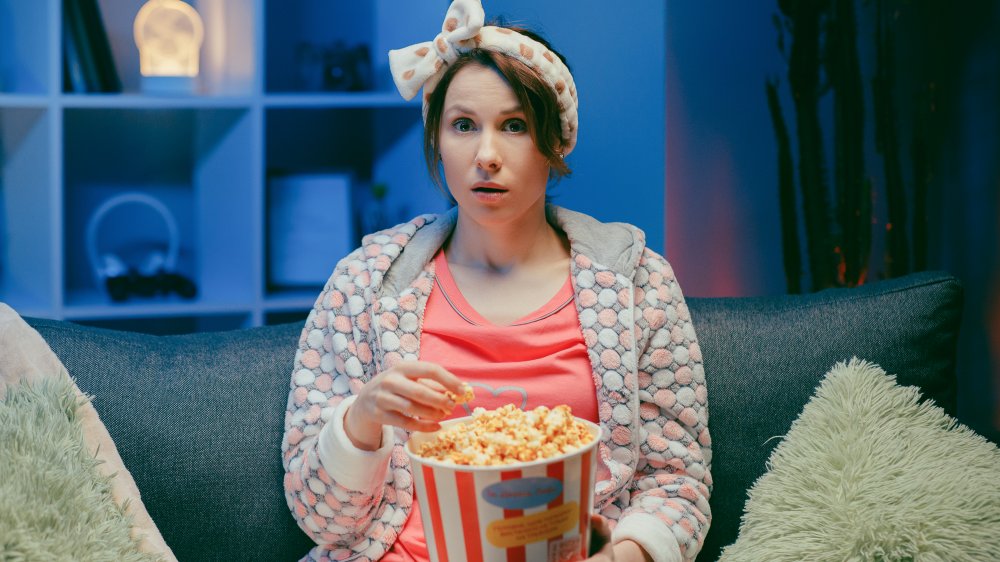When You Binge Netflix, This Is What Happens To Your Body
What did we ever do without Netflix? Founded in 1998, the media-services provider made a name for itself as a DVD rental company, effectively demolishing video rental stores like Blockbuster before launching its very own streaming service in 2007 (via BBC). Now a global machine, Netflix is the go-to service for millions of people across the world who would rather stay in and watch their favorite TV show or movie from the comfort of their own home than go out and spend their hard-earned cash on outrageously expensive movie theater tickets and snacks.
While there are few feelings more comforting than cuddling up on your couch and watching your favorite shows for the billionth time, health experts warn that habitually binge-watching Netflix could contribute to the development of a number of health issues — some of which could potentially prove to be fatal.
From a specific type of cancer to the less serious "dead butt syndrome," too much Netflix-binging could be hazardous to your health in ways you've likely never considered. Here's a look at what really happens to your body when you binge Netflix.
Your brain forms an addiction when you binge Netflix
Netflix's all-too-convenient streaming service lends itself perfectly to our society's obsession with instant gratification, often releasing every episode of a television series' season at once and allowing them to be gobbled up by Netflix users hungry for content. For example, Nielsen reported that a whopping 361,000 people watched all nine episodes of Stranger Things Season 2 the day of its premiere, according to Deadline.
So, what makes us want to stuff as much TV as possible into a single sitting? According to Dr. Renee Carr, Psy.D, people who binge-watch TV shows do so because, well, they're addicted. "When binge watching your favorite show, your brain is continually producing dopamine, and your body experiences a drug-like high," Carr explained to NBC News. She continued, saying, "You experience a pseudo-addiction to the show because you develop cravings for dopamine."
However, much like an addiction to drugs, an addiction to TV can wreak havoc on your personal relationships. As psychologist Dr. Judy Rosenberg told NBC News, "We are wired to connect, and when we disconnect from humans and over-connect to TV at the cost of human connection, eventually we will 'starve to death' emotionally."
Binge-watching Netflix could mean trouble for your heart
If you're like most people, you're not running on a treadmill, getting in a cardio workout while watching your favorite TV show. Instead, your Netflix binge is likely spent chilling on the couch with snacks on the table beside you and your beverage of choice in hand. While there are few activities more comforting than lounging on your sofa and binge-watching Netflix after a stressful day at work, experts warn this leisure-time activity could be taking a toll on your heart.
According to family medicine physician Sophia Tolliver, sitting still for long periods of time could have a lasting, detrimental effect on your cardiovascular system. "Studies show that sitting for long periods of time can increase one's risk for metabolic syndrome," which can "increase your risk of heart disease" and stroke, Tolliver told The Washington Post.
Tolliver also noted that most binge-watchers do so alone, cutting themselves off from many forms of socialization while also putting themselves at risk for heart troubles later in life. "Studies have connected a lack of socialization to increased risks of heart disease and stroke," Tolliver revealed to The Washington Post.
It's easy to pack on extra pounds while binge-watching Netflix
There are few challenges more difficult than trying to resist the urge to pig out on your favorite snacks while binge-watching your favorite show on Netflix. However, according to experts, it's important to pay close attention to what you're putting in your body, or else you'll finish Mad Men and realize you're ten pounds heavier than you were when you first met Don Draper and company.
Director of health promotion and communication at Harvard School of Public Health, Lilian Cheung, told NPR that people are more likely to overeat while binge-watching Netflix because they're too distracted to know when to stop. "When we are distracted while eating, or eating mindlessly, we are not paying full attention to the food in front of us, and miss the satiety cues letting us know that we are full," Cheung explained.
To keep yourself from binge-eating during your binge-watching marathon, Cheung recommends taking a break from the television when you're ready for a snack. "When eating, only eat," Cheung told NPR. She continued, advising, "Turn off the television [and] computer ... bring your full attention to the food in front of you."
Binge-watching Netflix takes a toll on your eyes
You'd be hard-pressed to find a person who hasn't experienced the specific, acute pain of dry, burning eyes that comes only after an all-night Netflix binge. While a good night's rest is usually the cure-all for the dreaded Netflix eyes, your binge-watching habit doesn't have to mean pain for your precious peepers.
Fortunately, most experts agree that television isn't likely to cause permanent eye damage. However, watching too much TV will likely result in eyestrain for many, which can subsequently cause a whole host of problems — including annoying headaches, sharp pain in the eyes, and overall fatigue (via optometry clinic Unionville Optometry). While treatable and non-serious, these side effects do pose a threat to your productivity and general mood, so it's important to take steps to prevent eyestrain caused by binge-watching Netflix.
According to Mayo Clinic, keeping the room in which you're watching TV softly lit could help relieve unnecessary strain on your eyes, as well as taking short breaks between episodes. Additionally, over-the-counter artificial tears can help combat dry eye symptoms, so you can watch your favorite shows for the millionth time without worrying about burning or itchy eyes.
Binge-watching Netflix can lead to sleep deprivation
Sorry, late-night Netflix binge-watchers — but your bedroom is no place to have a TV. As sleep specialist Dr. Dev Banerjee explained to HuffPost, having a TV in your bedroom means you're inviting stimulus into a room meant to be a calming, peaceful oasis for rest — subsequently wreaking havoc on your sleep schedule.
However, as reported by scientists from University of Michigan and Belgium's University of Leuven, binge-watchers are much more at risk of having their sleeping patterns disrupted than casual television viewers are. According to Psychology Today, binge-watching your favorite TV show may feel like a much-needed escape — but, in reality, the "pre-sleep arousal" created by a good binge-watch session seriously impacts your ability to fall (and stay) asleep.
But wait, there's more! According to a 2015 study published in the American Journal of Preventive Medicine (via Science Daily), an association exists between increased hours of television viewing per day and increased risk of death from most of the major causes of death in the United States — you know, just in case you needed extra inspiration to cut back on your TV time.
Anxiety and depression have been linked to binge-watching Netflix
Like a shining beacon of hope and entertainment, Netflix is always there when the pressures of adulting seem unbearable. However, according to health professionals, constantly using Netflix to escape from your real-world problems will likely only make you feel worse in the grand scheme of things.
According to the New York Post, Patient.info surveyed 2,000 people and discovered that participants aged 18 to 24 were three times as likely to feel depressed after binge-watching a TV series and twice as likely to feel anxious. On the other hand, participants 55 and over were less likely to feel symptoms of anxiety and depression after completing a Netflix binge.
Cal Strode, Senior Media Officer for the Mental Health Foundation, told the New York Post, "When we're feeling low we're often drawn to things that can make us feel worse, such as unhealthy fast foods or long periods of inactivity binge-watching TV." He continued, advising, "Whether you're struggling with feelings of emptiness, depression or anxiety, reaching out to your doctor, a friend or family member is a crucial first step on the road to recovery."
Binge-watching Netflix can be detrimental to your posture
While it might feel nice to settle into your couch and watch TV without paying any mind to your posture, your sitting position during these Netflix binge-watching sessions will likely cause you pain later in life.
According to Athletico Physical Therapy, there are three common "poor postural positions" caused by binge-watching — forward head, rounded shoulders, and flat back. As noted on Athletico's website, the forward head position is usually caused by looking up a TV "significantly higher than your head height." Rounded shoulders are a natural progression of the forward head position, making it difficult to fully expand your chest to breathe. And lastly, flat back is the "classic 'slumped' sitting position" inspired by most couches, in which you sit on your tailbone instead of your buttocks, causing your lower spine to lose its natural curve.
To keep your posture in check, the experts at Athletico Physical Therapy recommend using a lumbar support device while binge-watching (such as a pillow), lowering your TV height, and incorporating physical activity between episodes.
Binge-watching Netflix might take your breath away... literally!
While binge-watching Netflix is considered to be an enjoyable, leisurely activity, getting your entertainment fix can pose serious risks to your health. For example, binge-watching Netflix regularly could possibly take your breath away — and not just when you're gasping at Bird Box.
As noted by Athletico Physical Therapy, the "rounded shoulders" position which follows the "forward head" position causes your shoulders to curve into your chest, making it harder to fully expand your lungs when taking a deep breath. To compensate, your chest's secondary muscles take on the grunt work, lifting your chest so you can take a breath.
While you may not associate posture with lung capacity, health experts warn that sitting on your couch for extended periods of time could negatively impact your oxygen levels. According to research by healthcare company CogniFit, sitting and binge-watching Netflix for hours at a time actually "shrinks ... lung capacity by a third," causing a decreased oxygen supply to your brain (and, subsequently, a decrease in your mental clarity).
Binge-watching Netflix might raise your chances of getting bowel cancer
While binge-watching Netflix poses potential health risks for both men and women, research has found that men who make a habit of binge-watching their favorite shows are specifically at risk for developing a particularly scary disease.
According to research published in the British Journal of Cancer, which was carried out by Imperial College London, the University of Oxford, and the International Agency for Research on Cancer — men who spend four or more hours per day binge-watching television might have an increased risk of bowel cancer, as opposed to men who watch their favorite shows for less than an hour each day. The expansive study noted that a man's risk of developing bowel cancer saw a 35 percent increase if he was a habitual binge-watcher.
As Dr. Neil Murphy, lead researcher at IARC, told The Telegraph, binge-watching itself isn't a direct cause of bowel cancer. Instead, the behaviors associated with binge-watching are to blame. "Previous research suggests watching TV may be associated with other behaviors, such as smoking, drinking, and snacking more, and we know that these things can increase the risk of bowel cancer," Dr. Murphy explained.
Binge-watching Netflix is bad for your skin
For centuries, humans have been obsessed with their skin. From the castor, sesame, and moringa oils anti-wrinkle ointment used by ancient Egyptians to the milk baths of the 1600s, to the introduction of petroleum jelly in the 19th century — skincare has long been a top priority across the globe, as noted by INB Medical.
However, while it's important to stay up to date on the latest improvements in skincare, it's also important to know what products and activities damage your skin. And according to Dr. Justine Hextall, a dermatologist with The Harley Medical Group, habitually binge-watching Netflix is one of those damaging activities you'll want to avoid — unless, of course, you don't mind a little premature aging.
As Dr. Hextall told the Daily Mail, the high energy visible light (or HEV light) emitted by cell phone and laptop screens causes what she calls "Netflix face" by penetrating the skin's deeper layers, "upregulating an enzyme" known as MMP-1. "This enzyme breaks down skin collagen and elastin, the structures that keep the skin firm and youthful, leading to the development of fine lines and wrinkles, not to mention sagging skin," Dr. Hextall explained.
Binge-watching Netflix could lead to diabetes
Each year, 1.5 million new cases of diabetes are diagnosed across America. Chances are you or someone you know has diabetes — and, if neither of those statements rings true, it's likely you or someone you know will be diagnosed with the disease in the years to come.
Fortunately, there are steps you can take and habits you can break to lower your risk of being diagnosed with diabetes. Unfortunately for TV lovers, binge-watching Netflix is one of those habits you'll need to break. According to researchers, every hour you spend sitting on your couch and binge-watching Netflix could increase your chance of developing diabetes by 3.4 percent, as reported by Time. As noted by the study, an all-day Netflix binge could mean a 30 percent increase in your chances of being diagnosed with the disease.
Epidemiologist Andrea Kriska of the Diabetes Prevention Program Research Group explained to Time that sitting for extended periods of time drastically increases a person's chance of becoming diabetic, making binge-watchers an at-risk group. "With streaming TV ... you can watch a whole season in a day, so we expect to see increases in sitting to continue," Kriska told Time.
You could end up with blood clots if you binge-watch too much Netflix
If someone were to tell TV lovers that binge-watching their favorite Netflix shows could potentially kill them, it's safe to say the majority of Netflix bingers would find a new hobby, right?
Well, we hate to be the bearers of bad news, but a 2018 study from the University of Minnesota found that binge-watching Netflix could potentially lead to developing life-threatening blood clots, as reported by Deadline. According to the study, people who classify themselves as sitting and watching TV "very often" run a 1.7 times higher risk of developing venous thromboembolism blood clots (or VTE clots) in their legs. In addition to the blood clots, regular binge-watchers are at a higher risk for having a pulmonary embolism — a condition in which a blood clot travels to the lungs and blocks an artery (via Mayo Clinic).
As the study's lead researcher, Dr. Yasuhiko Kubota, explained, "Even individuals who regularly engage in physical activity should not ignore the potential harms of prolonged sedentary behaviors such as TV viewing." In other words, keep that body moving as much as you can in between episodes of The Crown, You, Love Is Blind, or whatever show you're obsessed with.
Binge-watching Netflix could lead to "dead butt syndrome"
Considering binge-watching Netflix has been proven to potentially contribute to the development of diabetes, life-threatening venous thromboembolism blood clots, and bowel cancer, getting "dead butt syndrome" from watching too much Netflix actually doesn't sound like such a bad deal. However, while its name doesn't exactly inspire fear, dead butt syndrome is definitely something you want to avoid.
Known within the medical community as "gluteal amnesia," dead butt syndrome occurs when the gluteus medius muscle located in your butt essentially forgets how to work properly. Why, you ask? Apparently, we're all too busy sitting on our butts and binge-watching Netflix to use it — and the gluteus medius muscle obviously subscribes to the "use it or lose it" philosophy.
"When you sit a lot, the hip flexor gets shortened and tighter, which leads to the butt muscles not firing or working as optimally as they should," physical therapist Chris Kolba explained to Self. Kolba continued, "If the glute muscles are not working efficiently or to their max capacity, then other muscles or areas will be subject to more stress [and] work, eventually leading to symptoms [elsewhere]."














